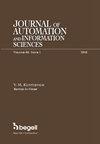以往外推方法与算子外推方法的收敛性
Q3 Engineering
Journal of Automation and Information Sciences
Pub Date : 2021-05-01
DOI:10.34229/1028-0979-2021-3-5
引用次数: 0
摘要
现代应用非线性分析的热门领域之一是变分不等式的研究。运筹学和数学物理中的许多重要问题都可以用变分不等式的形式来表述。随着生成对抗神经网络的出现,ml社区对求解变分不等式的算法产生了兴趣。本文研究了三种利用Bregman投影求解Hilbert空间中变分不等式的新算法。第一种算法是对两阶段Bregman方法的改进,在不知道算子的Lipschitz常数的前提下,低成本地调整步长。第二种算法,我们称之为算子外推算法,是用Bregman散度代替Malitsky-Tam方法中的欧几里得度规得到的。该算法的一个吸引人的特点是在可行集上的布雷格曼投影的迭代步骤上只需要一次计算。第三种算法是第二种算法的自适应版本,其中用于更新步长的规则不需要了解Lipschitz常数和计算附加点的算子值。对于Hilbert空间中具有伪单调、lipschitz -连续和顺序弱连续算子的变分不等式,证明了收敛定理。本文章由计算机程序翻译,如有差异,请以英文原文为准。
CONVERGENCE OF THE EXTRAPOLATION METHOD FROM THE PAST AND THE OPERATOR EXTRAPOLATION METHOD
One of the popular areas of modern applied nonlinear analysis is the study of variational inequalities. Many important problems of operations research and mathematical physics can be written in the form of variational inequalities. With the advent of generating adversarial neural networks, interest in algorithms for solving variational inequalities arose in the ML-community. This paper is devoted to the study of three new algorithms with Bregman projection for solving variational inequalities in Hilbert space. The first algorithm is the result of a modification of the two-stage Bregman method by low-cost adjusting the step size that without the prior knowledge of the Lipschitz constant of operator. The second algorithm, which we call the operator extrapolation algorithm, is obtained by replacing the Euclidean metric in the Malitsky–Tam method with the Bregman divergence. An attractive feature of the algorithm is only one computation at the iterative step of the Bregman projection onto the feasible set. The third algorithm is an adaptive version of the second, where the used rule for updating the step size does not require knowledge of Lipschitz constants and the calculation of operator values at additional points. For variational inequalities with pseudo-monotone, Lipschitz-continuous, and sequentially weakly continuous operators acting in a Hilbert space, convergence theorems are proved.
求助全文
通过发布文献求助,成功后即可免费获取论文全文。
去求助
来源期刊

Journal of Automation and Information Sciences
AUTOMATION & CONTROL SYSTEMS-
自引率
0.00%
发文量
0
审稿时长
6-12 weeks
期刊介绍:
This journal contains translations of papers from the Russian-language bimonthly "Mezhdunarodnyi nauchno-tekhnicheskiy zhurnal "Problemy upravleniya i informatiki". Subjects covered include information sciences such as pattern recognition, forecasting, identification and evaluation of complex systems, information security, fault diagnosis and reliability. In addition, the journal also deals with such automation subjects as adaptive, stochastic and optimal control, control and identification under uncertainty, robotics, and applications of user-friendly computers in management of economic, industrial, biological, and medical systems. The Journal of Automation and Information Sciences will appeal to professionals in control systems, communications, computers, engineering in biology and medicine, instrumentation and measurement, and those interested in the social implications of technology.
 求助内容:
求助内容: 应助结果提醒方式:
应助结果提醒方式:


